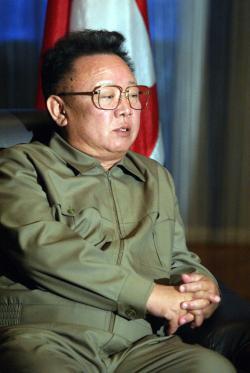Kim Il-sung was known to North Koreans as the “Great Leader.” His son and successor Kim Jong-il was “Dear Leader.” Will the next successor, Kim Jong-un, be a Great Leader, a Dear Leader, or some other kind of leader altogether? (Update, Dec. 22: State media in North Korea have dubbed Kim Jong-un an “Outstanding Leader.” The Slatest has more.) Who’s in charge of deciding which adjective to apply to North Korea’s dictator?
The Department of Propaganda and Agitation. As in other Stalinist dictatorships, propaganda is serious business in North Korea. The country’s propaganda office—modeled after the similarly named Soviet agency whose efforts gave rise to the term “agitprop”—is tasked with disseminating slogans, artwork, movies, and media reports that reinforce the regime. When it’s time to build support for a figure such as a new leader or heir apparent, they’re the ones who come up with a moniker.
It’s not entirely clear when Kim Il-sung, the dictator who took the helm in Soviet-backed North Korea after World War II, began to be referred to as the Great Leader. Some accounts have him assuming that grandiose epithet as early as 1949. Others say the term really took hold in the 1960s, when the Sino-Soviet split prompted him to distance himself from the Soviets and remold North Korea in his own image.
The man who did the most to reinforce it may have been his son. Perhaps looking to prove himself a worthy successor, Kim Jong-il took a leading role in his father’s propaganda machine and served as chief architect of his iconography. Though he didn’t come up with the term “Great Leader,” he promoted it insistently. By the early 1980s Kim Jong-il had established himself as a top party leader and his father’s heir apparent. He assumed the nickname “Dear Leader,” which can also be translated as “Beloved Leader,” in 1982, while his father was still Great Leader.
The titles “Great Leader” and “Dear Leader” make it sound as though any North Korean dictator would be described by some positive adjective attached to the word leader. But the translations can be misleading: Kim Il-sung’s and Kim Jong-il’s nicknames actually make use of different Korean nouns, with the former’s being the more exalted. In fact, Kim Il-sung’s moniker in Korean is a single word, suryong, while Kim Jong-il’s is a two-word phrase, chinaehaneun jidoja.
What about Kim Jong-un, the youngest son of the deceased? In 2009, the wheels of his succession were set in motion when he was given the nickname “Brilliant Comrade.” His path to power appeared cemented last year when he graduated to “Dear Young General.” And on news of his father’s death, state media outlets immediately dubbed him the “Great Successor.” Since Kim Jong-un, who is in his 20s, lacks achievements of his own, the nickname emphasizes the one trait likely to reinforce his legitimacy: his lineage.
Will the new ruler keep the name? It will depend on how events unfold. Should he remain in power for decades, he would probably shed the title to become some sort of “leader” in his own right.
Got a question about today’s news? Ask the Explainer.
Explainer thanks David Kang of the University of Southern California’s Korean Studies Institute; Han S. Park of the University of Georgia’s Center for the Study of Global Issues; and Clark Sorenson of the University of Washington’s Jackson School of International Studies.
